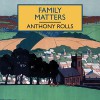Currently Reading






Find me elsewhere:
All in the Family
Ooooh, I'm so glad this book was rescued from oblivion by the editors of the British Library Crime Classics series. And I'm all the more glad for the fact that, reading its description, I didn't expect half the delights it would turn out to have in store.
Family Matters is, on its face, a take on the age-old theme of marital discord leading to murder -- one of the most prevalent topics in crime fiction practically ever since the inception of the genre, and done practically to death in its own right as a result of having been tackled by everybody from Arthur Conan Doyle to the Golden Age Queens of Crime and pretty much every other modern suspense and thriller writer. So, a rave review by Dorothy L. Sayers notwithstanding, I approached this with quite pinch of caution.
I needn't have worried, and I now fully understand why the ever-skeptical Sayers even went so far as to proclaim that she was "quite ready to accept anything that is told me by so convincing an author" as to the chemistry involved in bringing about the murder (or was it?) and in confounding, in turn, the police, the medical experts, the coroner, and (almost) the jury. (Though I would love to get a chemist's perspective on the accuracy of it all at some point.)
The real stand-out feature of this novel is Rolls's ability to sketch a character and an atmosphere, and his deliciously malicious sense of humor, which extends to pretty much everybody and everything involved in this sordid tale, beginning with the community in which it takes place, all the way to the fighting couple's neighbors and friends, the inmates and atmosphere of their horrid household, and the murdered man himself: if ever a character asked to be murdered, surely it is this story's Robert Arthur Kewdingham who, however, for all of Roll's scathing satire of the archetypal mysogynistic bully, still manages to be ... well, let's say at least two-and-a-half-dimensional.
Of course, towards the end of the story the judicial process is administered its due share of jibes as well, and in light of the Flat Book Society's recent read of Val McDermid's Forensics, I particularly enjoyed Roll's pick on the era's preeminent medical expert witnesses of the ilk of a Dr. Bernard Spilsbury:
"Pulverbatch was a thin, pale man, with an expression like that of a highly intellectual saint. He appeared to be in ceaseless communion with a fount of inner knowledge. When he spoke, he had a way of drawing back his thin lips, showing two rows of very small natural teeth, and occasionally giving a short whispering whistle. In the seclusion of his fine Bayswater home he attempted, with no great success, to play jigs upon the violin for the entertainment of Mrs. Pulverbatch.
'Hyaline deterioration?' said the Professor to his eminent colleague. 'Yes, my dear chap -- I quite agree with you. But look here ... [...] I never saw anything like it. I wish we had Chesterton here. But I think we shall ultimately come to the conclusion which I ventured to put forward as a working hypothesis at the start.'"
Though I do own, and have read, the paperback edition of this book, I also highly recommend the audio version narrated by Gordon Griffin, who has fast become one of my favorite go-to narrators of books by British authors (or set in Britain).
I read this book for the "Ironists" chapter / square of the Detection Club bingo, the image for which is actually taken from the cover of this particular book.










 8
8  6
6 